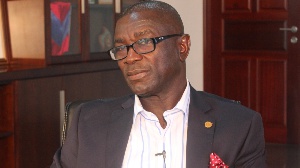Chief Executive Officer of UT Bank Prince Kofi Amoabeng has challenged government to concentrate on making the cedi much more predictable by exploring other avenues to consolidate it and restore investor confidence for business.
“I think the issue about predictability of the cedi cannot be overstretched. I am not saying appreciation or stability, but predictability of the cedi”
Mr. Amoabeng reckons it is now time for government to look at reviving the cedi in a way that makes it more predictable, given the currency’s volatility.
“For every business you want to know what your costs are and what your costs will be; if it is a foreign company, what will it be in the next three and four months? When we had the issue of the cedi losing against foreign currency and all of a sudden you gain about 25-30 percent, then the next couple of weeks it starts losing again; that is very disturbing.
“What I have said before is that I do not see the cedi losing value to the point where it is about 5 cedis to a dollar this year; it should not be the only source of foreign currency to the government, we have got the cocoa agreement which is signed and has brought in US$1.8billion. There are also IMF releases that will also come, as well as releases from foreign donors. These can sustain the cedi if we manage them properly.”
He also cautioned that the current load-shedding could scare away investors if government does not take steps to address it for the longer-term.
“Dumsor scares away everybody; from barber shops, manufacturers, salons, individuals who cannot sleep and do better work. The government had promised that it was going to end by September, but unfortunately it is now October -- though there has been some improvement, and hopefully by end of the year we should see the end.”
According to the UT boss government can put the economy back on track “if we can reduce corruption by 30%, things will improve and change the economy for the better.
“We also have to rebuild institutions and structures, as well as hold people accountable and responsible. Delays in government payments alone can cripple businesses. Government must ensure that we address these for the general good,” he said.
Business News of Saturday, 10 October 2015
Source: B&FT













